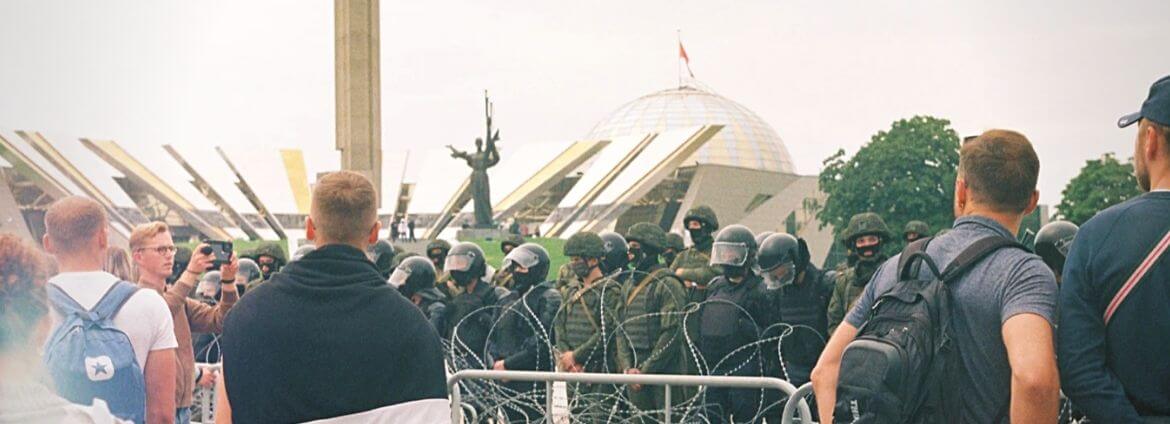- LEADING DISSIDENTS SENTENCED TO A DECADE IN PRISON
- AFTER LOSING TO LITHUANIA, LUKASHENKA USES MIGRANTS AGAINST POLAND
- MILITARY PRESENCE OF RUSSIA IS GROWING AHEAD OF JOINT EXERCISES
LEADING DISSIDENTS SENTENCED TO A DECADE IN PRISON
This is an update on the ongoing political crisis in the Republic of Belarus prepared for you by the International Strategic Action Network for Security (iSANS).
The crisis in Belarus lasts for nearly 13 months now. At least 136 individuals were convicted in politically-charged cases in August 2020 only. By September 7, the total number of acknowledged political prisoners grew to 659 people (full list of names here). A total of nearly 900 people are currently identified by the Belarusian human rights lawyers as convicts in ongoing political criminal cases.
This week, a TV channel controlled by Lukashenka acknowledged the first death row execution this year (in a case which is, however, not related to the ongoing political crisis). Belarus remains the last country in Europe and FSU to keep and regularly use the death penalty as a form of punishment.
On Monday September 6, civil rights activist and one of the leaders of the Coordination Council, Ms. Maryia Kalesnikava, was sentenced to 11 years in jail in a staged-show «court hearings». Kalesnikava was abducted by Lukashenka-controlled state security officials in September 2020. As a female leader of a deliberately peaceful movement for civil liberties, Kalesnikava was taken to state border with Ukraine and ordered to leave Belarus.
After she ripped up her passport on the borderline and refused to leave her home country into an exile, Kalesnikava was kept in detention for almost a year – only to be sentenced sentenced to over a decade-long imprisonment. Lawyer Maksim Znak was sentenced to 10 years imprisonment. Znak, along with Kalesnikava, joined the Coordination Council after Aliaksandr Lukashenka claimed victory in 2020 election. Since the puppetized «court» had no evidence whatsoever to prove Znak and Kalesnikava conducted illegal activity, the hearings were taking place in explicitly secretive fashion.
Both Kalesnikava and Znak were sentenced for extremism and efforts «to seize power» and «call for harm» to Belarus national security. However, all their activity was legitimate under national and international legal standards of political competition. Their only crime was challenging the acting head of state during presidential elections and supporting an alternative candidate – which is a completely legal act in any democratic state.
In Belarus, however, the logic of the system is based on an assumption that oligarch Aliaksandr Lukashenka is synonymous to Belarus as a state and should not be removed from his political post under any circumstances. AS a consequence, all political competitors of Lukashenka (except for spoilers who were assigned, controlled, or coordinated by the state security) ended up in detention or suffered from Lukashenka-led political violence before or immediately after all presidential campaigns in the last three decades.
Over the first 24 hours after the announcement of prison terms for Znak and Kalesnikava, the reaction of the West to extremely long prison terms assigned to two leaders of peaceful protests did not extend any further than verbal concerns and calls for justice. None of these measures affect Lukashenka and people involved in abduction and imprisonment of Kalesnikava and Znak. Instead, Minsk regime will consider lack of reaction as call for further criminal actions and repressions. Non-accountability of the regime for placing two outstanding dissidents in jail exposes the weakness of the West and its political leadership in the views of general public and affects trust in the power of democracy.
Both propaganda and the nomenclature within Belarus and Russia will undoubtedly use poor reaction of the West to extend the repressions and humiliate the mere position of democratic values in the West (as continuation of trade with Minsk-based regime is clearly seen by the general public as a deal above democratic ideals). The West cannot grant Lukashenka the privilege to silent the last major dissident voices who still remain in the territory of Belarus and already faced a year of injustice, torture, and inhuman treatment.
AFTER LOSING TO LITHUANIA, LUKASHENKA USES MIGRANTS AGAINST POLAND
On September 6, Poland’s parliament agreed to uphold the state of emergency along the country border with Belarus. The state of emergency was declared last week by President Andrzej Duda – for the first time in three decades of Polish post-communist history. The move is, likely, grounded on two considerations.
The first one is migration crisis coordinated by Lukashenka and supported by Moscow. Poland and the Baltic states officially treat intentional push of irregular migrants from the Middle East and Central Asia by Belarus state security as an act of «hybrid war» against their countries in revenge for EU sanctions. Lukashenka is weaponizing migrants and is widely using his TV propaganda team to sway public opinions and political decision-making in Eastern European NATO and EU member states. All to affect their counterparts internationally and inside their own countries.
For instance, although the humanitarian crisis is coordinated by the Minsk-based junta, the UNHCR is focused on Poland. The UNHCR office is forcing Poland to accept 30 Middle Eastern migrants who are being used as a weapon in Lukashenka’s game (and got stuck on the border with Belarus). However, the UNHCR is barely involved in the lives of an estimated 40,000 to 160,000 de-facto forcibly displaced civilians who fled their houses in Belarus fearing ongoing politically-motivated physical torture and seek temporary refuge across the region – in Poland, Ukraine, Lithuania and elsewhere.
The politicians from the region reasonably call for action to resolve the crisis on Belarus-EU border. The only ultimate solution to end hybrid warfare against the EU is complete removal of Lukashenka from political landscape and political decision making. Both goals can be reached through straightforward strategy towards Belarus that would clearly state the need to remove Lukashenka from any political power which he holds illegally and illegitimately. Inter alia, by making the cost of keeping Lukashenka too high for Russia. Lack of joint Western strategy and mutually exclusive decisions of Western states, West-led international organizations, and financial institutions (such as recent IMF case) impacts the integrity and effectiveness of economic and political pressure on the regime. The West has to be honest with itself and public opinions: the unconditional removal of Lukashenka from politics is the only solution of the ongoing humanitarian crisis in Belarus and along its borders with three NATO and EU member states.
The second rationale behind the decision of the Polish Parliament is the upcoming military drill Zapad-2021 that will take place in the territory of Belarus on September 10-16. According to Polish Prime Minister Mateusz Morawiecki, current situation on the border with Belarus is the newly-reached peak of tensions in the region since early 1990s.
MILITARY PRESENCE OF RUSSIA IS GROWING AHEAD OF JOINT EXERCISES
In August 2020, days ahead of Zapad-2021 exercises, Russian anti-aircraft missile troops had arrived to the city of Hrodna for a completely different endeavor. Armed with S-400 Triumph mobile surface-to-air missile/anti-ballistic missile system (NATO: SA-21 Growler), the troops were delivered to a military railroad station near one of the largest cities in Western Belarus (located 30 km from borders with both Poland and Lithuania) to set up a joint military education and combat center of Belarus and Russia.
The creation of this center may potentially grow into a full-scale base – and has two potential explanations. Either Lukashenka and Putin jointly blackmail the West to avoid new sanctions and simultaneously push the West into new «status quo» and accepting Lukashenka as the head of state, or Russia finally pushed Lukashenka into creation of a full-time military base that will be started as «education and combat training facility» in exchange to further support of Lukashenka from the Kremlin on the international stage.
Self-declared «president» of Belarus and Vladimir Putin have already met four times since the beginning of 2021 although Lukashenka is not internationally recognized as the head of state of Belarus. Lukashenka will again fly to Moscow on September 9 (just one day before joint military exercises with Russia) to sign the so-called «integration roadmaps».
It is important to highlight that whatever is signed by Lukashenka, should be treated as legally null and void since this individual does not have any official mandate or capacity to sign internationally-binding state agreements. And the West – foremost, the United States – must be very clear on that by simply executing what is already legally framed in the last 12 months. This includes making clear to Russia that it should avoid any further «integration games» with the Belarusian oligarch who lost 2020 elections and is currently a private individual who is accused of gross crimes against civilians, and is not a state official or legal representative of the Republic of Belarus.
Although Lukashenka claims ambitious plans to reequip his army, the real chances are low that he has money (and the Kremlin’s agreement) to acquire the latest weaponry from Russia, including SU-30SM fighter jets (NATO: Flanker-H). Although Lukashenka is using his public stand ups to promote «a single army» with Russians and his own intention to fight together in a war against the West, his partners in the Kremlin seem to be less enthusiastic about such development of events. However, the Kremlin definitely wouldn’t mind further «donbasization» of Belarus conducted with the hands of its long-lasting proxy who is now cornered in Minsk.
Best regards,
iSANS team










